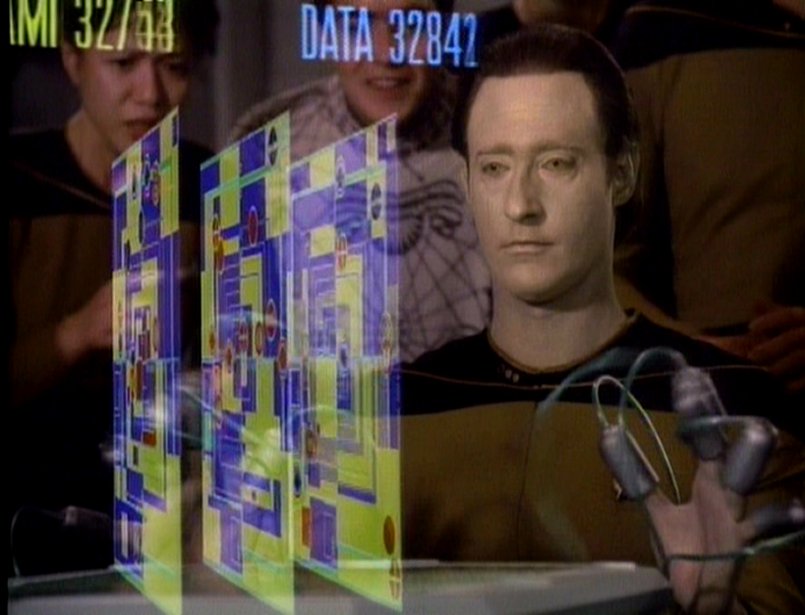Stacey Abrams, Star Trek Superfan

Georgia politician, almost-Governor, and Democratic superstar Stacey Abrams has a secret to her success: she loves Star Trek. In particular, she loves my favorite Trek series, Star Trek: The Next Generation.
In explaining her approach to politics as a black Democratic woman in a state controlled by white Republican men, she devotes several pages to a pivotal scene from “Peak Performance,” an episode from “Star Trek: The Next Generation.”
In the episode, Data, the preternaturally pale android with a greenish cast to his skin, is playing Strategema, a game that appears to be some incredibly complicated form of 3-D holographic chess, against a humanoid grandmaster named Kolrami. Data cannot defeat Kolrami, he discovers, but he can outlast him, drive him into a rage and force him to quit the game, which is itself a kind of victory.
Ms. Abrams writes that this has helped her focus her own thinking. “Data reframed his objective — not to win outright but to stay alive, passing up opportunities for immediate victory in favor of a strategy of survival,” she says in the book. “My lesson is simpler: change the rules of engagement.”

This sparked some predictably joyous reactions among Star Trek fans:
Stacey Abrams is a STAR TREK FAN?! Please insert that viral “Unfollow me now, this is the only thing I’m going to talk about all day” gif…
— Ebony Elizabeth (@Ebonyteach) March 7, 2019
(And she loves Queen Nichelle? And this article came out just in time for #TrekThursday, with more DSC tonight?)
@EbWatchesTrek
And the following thoughtful thread from Manu Saadia (@trekonomics) on the history of progressive politics, as modeled in the Star Trek universe:
First off, that piece by historian @robgreeneII should convince @staceyabrams to take a second L ok at Deep Space 9.https://t.co/nlcpDm0svC
— manu saadia (@trekonomics) March 8, 2019
Next, that long and detailed piece of Trek fandom. A special piece for me, as we had drinks with @mollitudo at the Convention in Vegas while she was reporting it. The Utopia is the fandom. https://t.co/FodCf34kXU
— manu saadia (@trekonomics) March 8, 2019
A look at 10 episodes:https://t.co/bmmWGzdbs2
— manu saadia (@trekonomics) March 8, 2019
I am always embarrassed to mention myself, especially in such great company, but here we are. https://t.co/g1gbNqr1Yi
— manu saadia (@trekonomics) March 8, 2019
Politics is also about gender roles.https://t.co/HxEs3AoZjS
— manu saadia (@trekonomics) March 8, 2019
And guess what, MLK was a fan - and convinced Nichelle Nichols to stay on that silly space show after the first season.https://t.co/hhPFJEBWUr
— manu saadia (@trekonomics) March 8, 2019
The sexual politics of Trek became more and intriguing as the show matured. Jadzia Dax, DS9’s science officer and “old man” (eh!), was particularly adventurous - (and deftly incarnated by) @4TerryFarrell https://t.co/ZwQrHnL3r3
— manu saadia (@trekonomics) March 8, 2019
Star Trek is a powerful source for political imagination. It is the Utopia of our times.
— manu saadia (@trekonomics) March 8, 2019
Star Trek is a thought experiment on how humans would behave under terminally improved conditions. This is why it matters. There’s very little sci-fi that takes on that big question.
— manu saadia (@trekonomics) March 8, 2019
Live long and prosper! And no, it doesn’t mean “make money!” pic.twitter.com/U4NTO1vd4z
— manu saadia (@trekonomics) March 8, 2019
It actually is possible to overthink this. All of this about politics and the imagination and utopian possibilities is true. But at the same time, ultimately, it’s just a really cool show. It’s one we grew up with. And as politicians get younger, it’s one we’ve always had with us, framing our background on entertainment, war, morality, politics, economics — everything.
The world the original Star Trek entered was one where space was only beginning to open, as a direct consequence of the nuclear and geopolitical crisis than enveloping the planet. Now, we have all new geopolitical crises to deal with. Star Trek offers a surprisingly resilient fictional framework for understanding most if not all of them. That’s a powerful tool. It’s foolish to pass it up.
Oh, and Ms. Abrams — keep bustin’ ‘em up.





Stay Connected